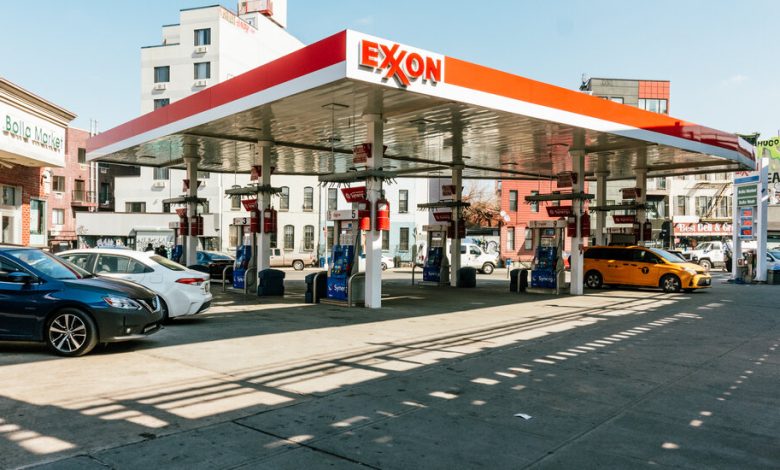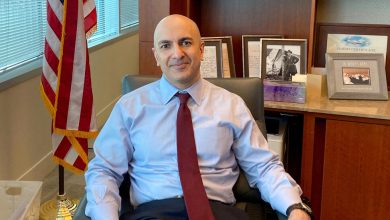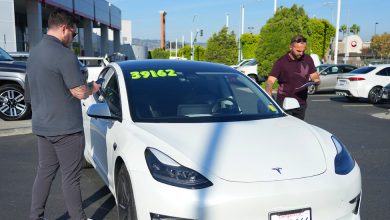A Mega-Deal May Await in the Oil Patch


A potential takeover of the shale oil giant Pioneer would be Exxon Mobil’s biggest deal in 25 years.Credit…DeSean McClinton-Holland for The New York Times
Blockbuster M.&A. may be back
Reports that Exxon Mobil is near a $60 billion takeover of the shale oil producer Pioneer Natural Resources — in what would be the biggest deal of the year — are the latest sign that cash-flush corporate titans are once again willing to buy growth. (The reports caution that talks between Exxon and Pioneer are continuing and may not lead to a transaction.)
Moreover, they’re likely willing to confront President Biden’s antitrust regulators in doing so.
A Pioneer deal would transform the U.S. oil industry, which had been riding high off a surge in crude prices. (The oil market has gotten bumpier lately; more on that below.) Exxon’s profits climbed to a record $59 billion last year and its cash hoard grew to nearly $29.5 billion. Buying Pioneer, the largest player in the oil-rich Permian Basin in the southwestern U.S., would help Exxon produce 1.3 million barrels a day in the region, more than the entire output of many OPEC countries.
Analysts and deal makers have speculated that industry consolidation was coming. Investors increasingly favor fat dividends and stock buybacks over funding cash-intensive expeditions for new sources of crude, leaving M.&A. as one of the few ways such companies could grow. Pioneer itself spent $11 billion on acquisitions two years ago. Pioneer shares were up more than 10 percent in premarket trading, while Exxon’s stock was down more than 2 percent.
It would also show major oil companies doubling down on their traditional business, despite pressure to spend more on greener energy. Exxon has said it will invest $17 billion through 2027 in carbon-capture technologies, a plan that includes buying Denbury, a carbon pipeline operator, for $4.9 billion — but has made clear that its focus is on the oil patch.
Business leaders are also getting more comfortable with the economic landscape. Deal makers say that confidence to do big transactions is growing as the outlook for interest rates and the job market becomes clearer. Such deals would revive a moribund M.&A. market, where the $2 trillion worth of activity in the first nine months of 2023 represents the lowest level for that time period in a decade, according to LSEG.
Already this year, Pfizer agreed to pay $43 billion to acquire the cancer drug maker Seagen, and Cisco announced a $28 billion takeover to buy the data-analysis provider Splunk, its largest-ever takeover. (Pioneer would be Exxon’s biggest deal since buying Mobil for $80 billion in 1998.)
Companies also appear less worried about antitrust scrutiny, despite the F.T.C. and the Justice Department threatening to oppose corporate consolidation. Privately, business leaders say that they are feeling emboldened after the F.T.C. struggled to block Microsoft’s $70 billion takeover of Activision Blizzard.
HERE’S WHAT’S HAPPENING
Donald Trump endorses Jim Jordan for House speaker. The former president’s backing of the combative and staunch conservative may give the Ohio lawmaker a leg up over his main rival for the position, Steve Scalise of Louisiana. Still, both Jordan and Scalise face skepticism from moderates in their party; House lawmakers are set to vote for speaker next week.
An FTX co-founder says that Sam Bankman-Fried committed fraud. Gary Wang, who is cooperating with federal prosecutors, testified at Bankman-Fried’s trial yesterday that they gave special privileges to Alameda Research, an FTX-affiliated trading firm accused of stealing billions worth of customer funds from the exchange, and lied about it. (Bankman-Fried has pleaded not guilty.) Meanwhile, an FTX programmer said that Bankman-Fried appeared worried about the exchange’s debt last summer, telling him that “we’re not bulletproof.”
Stocks and bonds are up modestly ahead of today’s jobs report. Economists are forecasting that the nonfarm payrolls report, due out at 8:30 a.m. Eastern, will show that employers added roughly 170,000 jobs last month, a fall from August. Investors will be focused on wage data for insight into the Fed’s next policy move.
MGM Resorts says a cyberattack cost it $100 million. The casino operator refused to pay a ransom when hackers targeted its systems last month, crippling its properties in Las Vegas and elsewhere, according to The Wall Street Journal. A rival, Caesars, is said to have paid a $15 million ransom after a similar incident this summer.
An oil price reversal
An abrupt turnaround in oil prices has quieted a chorus of predictions that crude would soon top $100 a barrel. The apparent culprit: slowing global demand.
Brent crude, the global benchmark, is trading at around $84 a barrel this morning, and is on pace for its worst weekly decline since March, Deutsche Bank analysts wrote in an investor note this morning. Brent is down roughly 13 percent since surpassing $96 a barrel on Sept. 27.
This morning, Moscow lifted an export ban on diesel, removing a major supply bottleneck for the fuel that powers trucks, agricultural equipment and factories.
Ed Morse, Citi’s global head of commodities research, says the price of Brent could fall to around $74 next year, a level that could dent some enthusiasm for further deal making in the sector.
Musk’s latest clash with the S.E.C.
The S.E.C. is taking on Elon Musk again. The agency is suing the tech mogul to force him to testify as it investigates whether he broke securities laws in rapidly accumulating shares in Twitter ahead of his $44 billion takeover last year of the social media platform, now named X.
S.E.C. rules require investors who acquire more than 5 percent of a publicly traded company to disclose that within 10 days. Musk amassed 9 percent of Twitter between January and April last year, but was late in filing a disclosure form. Musk was subpoenaed to testify last month about his stock purchases, but he “failed to appear,” the S.E.C. said in a filing yesterday.
It’s not the only Twitter suit Musk faces. A Manhattan federal judge recently denied Musk’s motion to dismiss a lawsuit contending that he defrauded former Twitter shareholders by failing to disclose his share purchases in a timely manner. Shareholders’ rights around such matters have taken on new significance with the Supreme Court deciding to hear a case about how delayed corporate disclosures affect investors.
The legal bar is fairly low for the S.E.C. Theagency needs only to prove that Musk was late with his disclosure. Recent fines for such penalties have maxed out in the hundreds of thousand of dollars, Ann Lipton, a professor of corporate governance at Tulane Law School, told DealBook.
Conversely, she said, the plaintiffs in the New York suit would need to prove intent. “The private plaintiffs have a much higher penalty, but they have a lot of hoops to jump through before they get there,” Lipton said.
Musk’s brushes with the S.E.C. go back years. In a settlement with the agency, Musk and Tesla agreed to create a roughly $42 million fund to reimburse Tesla shareholders after he tweeted in 2018 that he had “funding secured” for a potential buyout of the company.
-
In other Musk news: Linda Yaccarino, X’s C.E.O., reportedly told the company’s lenders that advertisers had returned to the platform, but were spending less money. It also plans to introduce an expanded monthly subscription plan to generate more revenue.
“We don’t want to be the German car industry of news publishing.”
— Emma Tucker, The Wall Street Journal’s new editor in chief, telling staff that the newspaper needed to adapt to avoid a fate similar to that of German carmakers that have fallen behind in electric vehicles. Since taking the top job in February, Tucker has sought to refocus on business news and the paper’s digital audience, and has jettisoned senior editors.
Chip makers push back on China rules
When the Biden administration passed the CHIPS Act a year ago, American chip makers seemed to accept restrictions designed to stymie the sale of advanced semiconductor technology to China. But as the White House looks to impose new limits, Nvidia, Qualcomm and Intel are pushing back to save their China businesses, write the Times’s Tripp Mickle, David McCabe and Ana Swanson.
China is a huge market for chips. The three companies make more than $50 billion in combined annual revenue in the country, which represents about a third of the global semiconductor market. They warn that depriving them of that revenue would hurt their ability to innovate, making it harder for the U.S. to develop its domestic chip-making industry.
The companies’ C.E.O.s are lobbying Washington. In July, Pat Gelsinger of Intel, Jensen Huang of Nvidia and Cristiano Amon of Qualcomm met with Antony Blinken, the secretary of state; Gina Raimondo, the commerce secretary; and Jake Sullivan, the national security adviser, to talk about their worries. (Intel is said to have questioned whether national security officials understood semiconductor technology, a claim the company denied.)
Nvidia has also tried to influence key think tanks. Hackles were raised in Washington over concerns that the company tried to sideline the director of the Center for Strategic and International Studies, who supports export restrictions. Nvidia said it hadn’t acted “improperly.”
National security experts and some lawmakers aren’t happy. They point out that the White House committed $50 billion to the industry when it passed the CHIPS Act, to bolster chip making at home. The House committee on competition with China is weighing whether to question the companies over their compliance with export controls.
THE SPEED READ
Deals
-
Shares in Mirati Therapeutics soared over 40 percent after a report that Sanofi is weighing a takeover offer for the cancer drug maker. (Bloomberg)
-
Tom Brady’s bid for a minority stake in the Las Vegas Raiders has reportedly stalled amid an N.F.L. investigation into whether the deal price is too low. (WaPo)
-
European regulators are said to be examining whether Adobe’s $20 billion takeover bid for the software design company Figma would lead to higher prices in the market. (Bloomberg)
Policy
-
The White House will expand the Trump administration’s wall on the Mexican border and begin deporting thousands of Venezuelans to slow a migrant surge. (NYT)
-
Donald Trump is said to have shared classified information about American nuclear submarines with Anthony Pratt, a billionaire Australian businessman who is a member of his Mar-a-Lago club. (NYT)
Best of the rest
-
“Women Could Fill Truck Driver Jobs. Companies Won’t Let Them.” (NYT)
-
How the N.F.L. has cautiously embraced sports gambling. (WaPo)
-
A $30 million Cezanne painting and a Giacometti sculpture are part of a Senate Finance Committee investigation into Leon Black’s business dealings with Jeffrey Epstein. (NYT)
We’d like your feedback! Please email thoughts and suggestions to [email protected].




